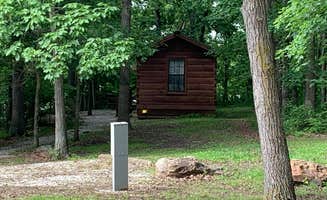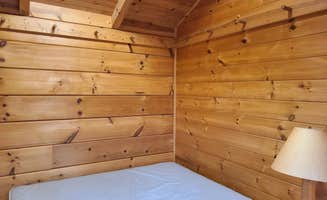Hunnewell Lake Conservation Area offers free primitive camping near La Grange, Missouri, with vault toilets and potable water access. The terrain consists of a mix of open grassy areas that slope toward the lake, creating challenges for level setups. Campers should expect limited shade and potentially active insect populations, especially during summer months when the lake attracts numerous visitors for fishing and boating activities.
What to do
Free boating opportunities: Hunnewell Lake Conservation Area provides complimentary canoes and rowboats for visitor use. As one camper noted, "They had rowboats and canoes you could paddle around in. You just needed your own life jacket. The boats were free." Visitors must bring personal flotation devices to utilize these watercraft.
Fishing access: Coyote — Mark Twain State Park offers excellent fishing opportunities with dedicated cleaning stations. "There is a fishing cleaning station. Periodic vault toilets throughout sites though they do not show up on map," one visitor observed. The lake contains various fish species and maintains good water clarity.
Geode hunting: The area surrounding The Catfish Place Campground is known for mineral collecting. One reviewer mentioned, "Close to geode hunting locations!! Quiet. There is also a restaurant on site." Local rock shops can provide maps to productive collection sites within driving distance.
Historical exploration: Visit Mark Twain's birthplace memorial within driving distance of camping areas. "Be sure to check out Mark Twain's Birthplace!" a camper recommends. The historical site maintains limited operating hours, typically 10am-4pm during peak season.
What campers like
Affordability: Budget-conscious campers appreciate the free camping options. "Can't beat the price - FREE!" noted one reviewer of Hunnewell Lake. Conservation areas typically maintain no-fee policies year-round, while state parks charge between $12-30 depending on amenities.
Off-season solitude: Indian Lake Park remains open year-round with significantly fewer visitors during weekdays and colder months. "Almost empty during the week, but very busy on summer weekends," a camper observed. Winter camping provides quieter experiences with properly rated equipment.
Diversity of accommodations: Several properties offer multiple lodging types for different comfort preferences. "This park has something for everyone. They have primitive tent sites, electric only, electric+water, and fhu. They also have cabins for rent. All very reasonably priced," according to a visitor at Indian Lake Park.
Clean facilities: Maintenance standards receive consistent praise from users. "Very modern facilities that were clean," noted one camper. Most established campgrounds in the region provide shower facilities with regular cleaning schedules, especially during peak season.
What you should know
Generator etiquette issues: Noise complaints occur at some properties without strictly enforced quiet hours. "The rules about quiet time are not enforced and some idjit ran his loud generator until 1 am. We ended up moving away from him at 11:30," reported one camper at Hunnewell Lake Conservation Area.
Site leveling challenges: Many camping areas feature sloped terrain that requires leveling equipment. "The campground slopes toward the lake, so finding level ground is a challenge," noted a visitor. Bringing leveling blocks or selecting sites carefully improves the camping experience.
Seasonal closures: Yogi Bears Jellystone Park operates only from April through mid-November. One visitor mentioned, "Came when all the water activities were closed for the season. Cannot wait to come back!" Most water-focused amenities shut down after Labor Day regardless of campground opening dates.
Rustic yurt options: Limited yurt camping near La Grange, Missouri exists at select properties requiring advance booking. Yurt structures typically include basic furnishings and may require bringing personal bedding. Most yurt camping facilities in the La Grange region maintain seasonal availability with higher demand during summer months.
Tips for camping with families
Age-appropriate activities: Mark Twain Lake Jellystone Park schedules structured programming during operating seasons. "The activities are not all day, so plan on some campside entertainment before 10am and after 6pm," advises one visitor. Bringing supplemental activities fills schedule gaps.
Swimming options: Several properties maintain beach access or pool facilities with varying policies. "Lake with a nice sandy beach," noted a camper at Indian Lake Park. Swimming areas typically operate during daylight hours with no lifeguard supervision at most locations.
Budget considerations: Family-oriented resorts charge premium rates for amenities. One camper observed, "This is expensive but has a lot of activities. It is loud and busy on the weekend, which was expected." Weekday visits often provide better value with reduced rates at many properties.
Educational components: Conservation areas incorporate nature education opportunities. "Great family location and for expanding children's knowledge," noted one camper. Ranger programs occur seasonally at select properties, typically on weekend mornings during summer months.
Tips from RVers
Site selection priorities: RV campers recommend choosing locations away from high-traffic areas. "We were in off season with pool being closed etc... thought prices were too high for not having any amenities. One bath house was very dirty... We did like the nice rv sites though," a visitor at Mark Twain Lake Jellystone Park reported.
Water and power availability: Conservation areas typically offer limited hookups compared to commercial properties. "Generators are ok just make sure they are not too loud and try to if possible running them only when needed," advises a camper at Hunnewell Lake Conservation Area. Bringing additional water storage extends stays at primitive sites.
Dump station access: Most properties provide sanitation facilities with varying accessibility. "They also have a dump station," mentioned one reviewer. Conservation areas sometimes position dump stations near ranger stations rather than within camping loops, requiring planning for departure procedures.



